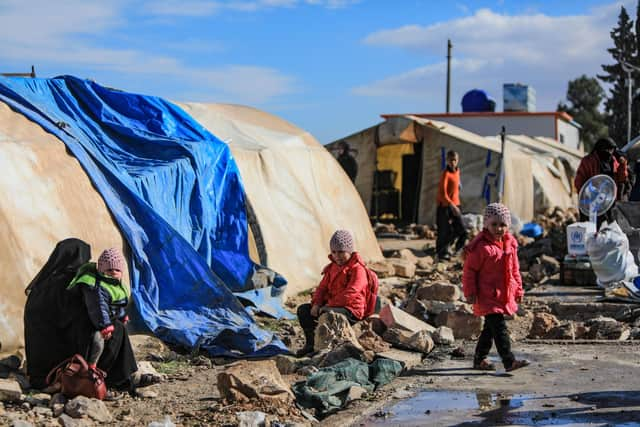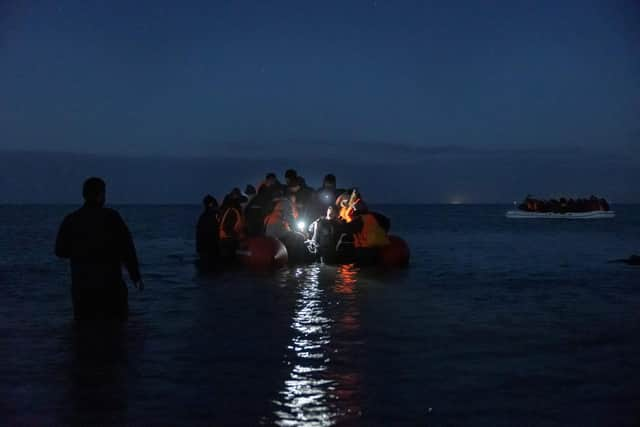As a Syrian refugee in Scotland, I want to explain what it's like to flee your home country and make a new life – Anonymous
Every day seemed longer than it was and, at the time, I couldn’t speak English so I couldn’t confide in anyone, explain what I was going through, or ease my mind. I felt alone, like I was in jail in my head.
With Father’s Day just behind us and during Refugee Week, I wanted to share my experiences as a father, a refugee, and as a resident of Scotland because it’s rare that anyone hears the experiences of people like me, especially dads who leave home alone so they can find safety and sanctuary for their family in another country, another part of the world.
Advertisement
Hide AdAdvertisement
Hide AdThere are a lot of myths about people like me so I want to show why, as a father, I took the steps I did because I think any dad would understand.
The theme of Refugee Week this year is healing and I know I couldn’t have even begun to heal from my experiences in Syria if I didn’t have my family with me.
I had to leave because I was being threatened during the war and I knew I had to get both me and my family as far away as possible if we were to be safe.
You may have read about men taking dangerous journeys or crossing the Channel on boats but that wasn’t my experience. I was lucky because I had a UK visa and didn’t have to risk my life to get here. I got on a plane.


Others I know did die along the way, having never been reunited with their families.
But just because I was able to come to Scotland by a rare safe and supposedly “legal” route, that doesn’t mean my experience seeking asylum in Scotland was an easy one.
Arriving in the UK was just one step in a long process, one that tested me to my limits and had a profound impact on my mental health.
It took a year for my asylum claim to be processed and, working with the British Red Cross family reunion team, it took another year on top of that before my wife and two children could join us in Glasgow.


Advertisement
Hide AdAdvertisement
Hide AdIt was a real nightmare; there was so much paperwork and so much evidence to gather. Luckily, I was a journalist in Syria, so I was able to be clear about my story but, when you live in a war zone, basic, practical things like personal documents get lost along the way.
And still it took months and months. I know other men whose families have been killed while they’ve been waiting. I’ve known other men who have killed themselves.
Any father or mother would understand the emotions – the pain, anxiety, the horrible uncertainty.
Imagine having to prove that your children are actually your children.
But any parent would also understand why I persevered because, after two years away from my wife and children, they were able to join me in Scotland and are now safe at last. It may have been stressful but it was a memorable moment when they got here.
There have been challenges since, including moving my family into homeless accommodation as soon as they arrived here and living in a home with mould and damp that damaged my health and the health of my children. I’ve been through so much in these last few years, I’m now registered disabled.
The whole process seems designed to end in failure for families like mine but, when your safety is threatened, you’ll look to get to the safest place you can whether that’s Scotland, Germany, Canada, France.
It’s only when you understand what people have suffered at home that you can understand why they put themselves through the things they do, why they take the risks they do, and why they endure the torment of family separation. It’s hard to define a parent’s compassion but that’s what drives you at all times.
Was it worth it? For me, it definitely was.
Advertisement
Hide AdAdvertisement
Hide AdI am grateful that I was able to get my family to a safe country and that we were able to start a new life.
I do not think I would have been able to move forward with my life if I didn’t have my family with me. I've seen what’s happened to other fathers who haven’t been so fortunate.
How could I heal without them?
In my culture, when you get married, you make a commitment to your wife and your children. As a father and husband, it is my duty to ensure my family is OK and living in a peaceful and safe environment, at the very least.
Now I feel, together, we can move past the trauma we have experienced and we are closer to healing.
I still have family members in Syria and I worry about them but, now my wife and children are with me, I am troubled less by lack of sleep, depression, and anxiety.
I have learned English now, studied at college, and am involved with organisations, like the Red Cross, in my community. I’m able to better myself, to live a normal family life in peace.
When you think of the experiences I and so many others have been through, you can’t help but think it should have been easier to achieve this than it was. It should have been quicker, more humane; our housing needs and the needs of our children, especially their health, should have been properly considered.
Thankfully, very few people in Scotland will ever have to go through what I and others like me have experienced.
Advertisement
Hide AdAdvertisement
Hide AdBut I would ask any parent: if you were lying awake and worrying that this could be the day you lost your family, how long would you want to wait? How much scrutiny would you want to be put under?
How could you even begin to heal until you knew that you had done your duty by your family and found them a safe place where they could heal themselves, grow, and – ultimately – flourish.
If you believe, like me, that Every Refugee Matters, please sign the pledge at www.everyrefugeematters.redcross.org.uk
Comments
Want to join the conversation? Please or to comment on this article.
